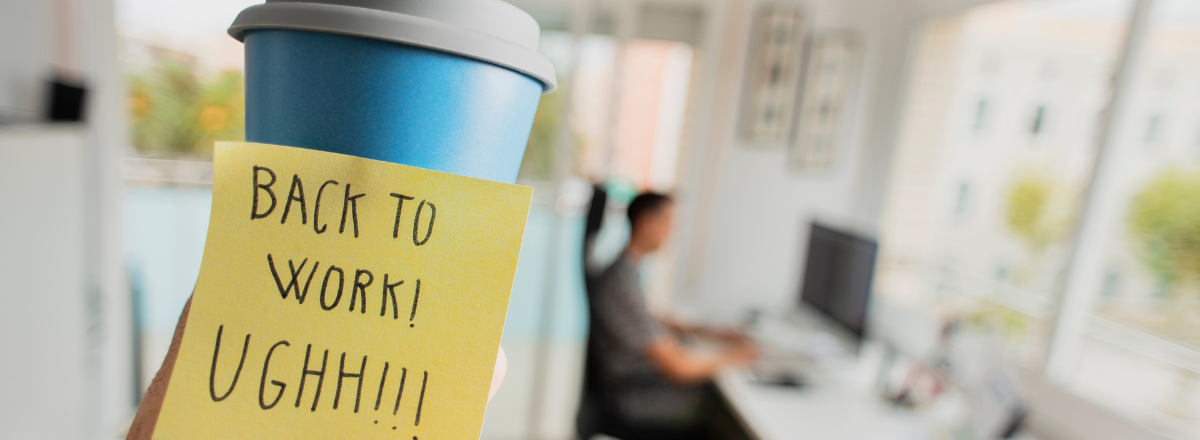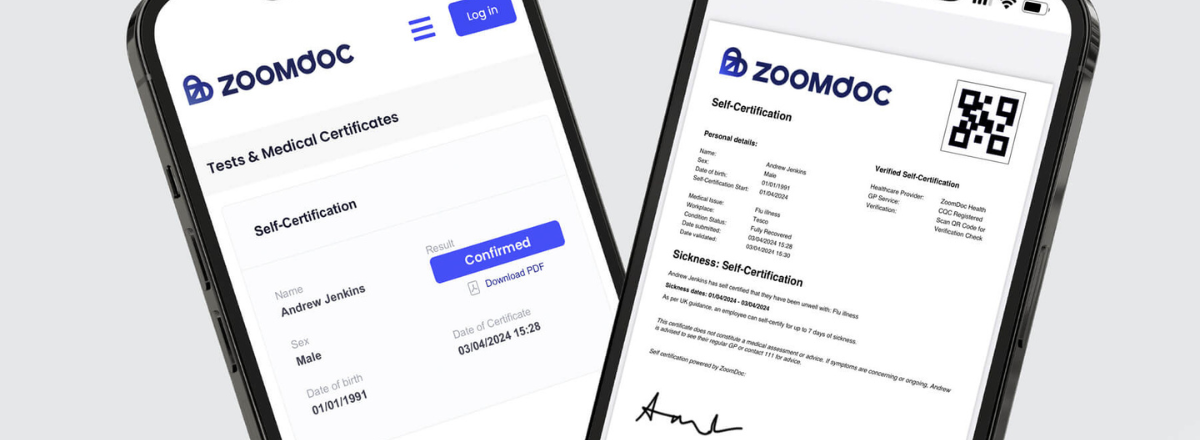When you’re struck down with a virus, sickness bug or some other illness, all you want to do is rest and recuperate – and to feel better as soon as possible! But if you’re in employment, there can be the extra headache of administration to sort out either while you’re off or once you’re better.
Your employment contract or team handbook should explain the procedure to follow while you’re absent from work, for example phoning or emailing your line manager to make them aware and keeping them updated on your illness, condition and progress.
But what about sick notes? When are they required and do you even need one?
‘Official evidence of what’s keeping you off work – in the form of sick notes, fit-to-work or recovery certificates – are only required if you’ve been off for more than seven days,’ says Dr Kenny Livingstone, a GP and Chief Medical Officer of ZoomDoc, a private GP service offering online appointments and medical letters to take pressure off the NHS.
‘However, if you’re off work for a short period, you will need to do something called “self-certification” once you’re back at work,’ says Dr Kenny.
‘It’s a relatively straightforward process but if you haven’t heard of it or aren’t aware of what it involves then it can cause unnecessary added stress, which is not ideal when you’re trying to catch up on what you’ve missed,’ he adds.
So if you’ve never heard of self-certification or are not sure how to do it, keep reading to find out what it involves.
Plus, find out how ZoomDoc can make the whole process even smoother so you can get back to work without any extra headaches.
GET A SAME-DAY SELF-CERTIFICATION LETTER FROM ZOOMDOC
Self-certification: what is it?

When someone is off sick, they can ‘self-certify’ for 7 calendar days. This means they can tell their employer they’re not well enough to work.
Once you return to work after time off sick you’ll need to provide some written confirmation regarding your absence.
You can self-certify if you’ve been for less than seven calendar days, including weekends – that’s according to the latest advice from ACAS (the independent Advisory, Conciliation and Arbitration Service).
NHS guidance adds that in order to work out the number of days that you’ve been sick, ‘you need to count all the days in a row you’ve been sick. This includes days you do not usually work, such as weekends and bank holidays.’
All this means is giving written confirmation yourself, without requiring a doctor to vouch for you.
This can usually be done via an online form or by sending an email to your HR contact or line manager but every company will have its own procedure to follow.
You only require medical evidence, such as a doctor’s letter or official sick or fit note if you’ve been off sick for longer than this seven-day period.
Read more about sick leave support.
Why do employers require self-certification?

When employees return to work, their employer can ask them to confirm they’ve been off sick. This is called ‘self-certification’.
If you’re off sick and need it Self-certification provides a written confirmation of your time off work with common illnesses or conditions that get better fairly quickly.
It provides employers with proof for their own workplace sickness policy and can be beneficial for:
- tracking absence
- supporting and managing employees effectively
- claiming statutory sick pay (SSP).
Self-certification sickness notes – what are they and how to get one

ZoomDoc’s same-day self certification medical certificate will explain your illness and symptoms, whether your condition is ongoing or resolved and confirm both the first and last dates of your self-certification.
In order to be proactive and help your return to work go smoothly and stress-free, ZoomDoc offers a new online self-certification service making it really easy to self-certify.
How does it work?
‘Employees simply need to order our Self-Certification Sickness Note online for £5 and then complete a short medical questionnaire. Our doctors will then review the medical information and send over your self-certification sickness note within a few hours,’ says Dr Kenny.
You’ll receive a same-day letter containing the following details:
- your name, date of birth and workplace
- your self-certification start and end dates
- your sickness or medical condition, when symptoms started and if they are ongoing or you are now recovered
- signature and verification by a GMC-registered UK doctors
- contact details and QR code enabling a verification check.
‘There’s no need to see a doctor – simply order yours and have it ready to send to your employer or HR department once you are back at your place of work,’ says Dr Kenny.
Order your Self-Certification Sickness Note
Self-certification sickness notes vs fit notes: what’s the difference?
Both provide evidence for time off work due to illness. As mentioned above, you can only self-certify for a short time off work (seven days).
Fit notes, also referred to as sick notes or doctor’s notes are required once you’ve been off work longer than seven days.
Although you can get fit notes from your NHS GP, these are also available via ZoomDoc for £45.
‘Ordering yours online means you will not have to waste a doctor’s appointment to get a letter that you may have to return to collect at a later date,’ says Dr Kenny.
Order your same-day Work Sickness Certificate.
If, however, you specifically require an NHS Med3 fit note, these are only available from healthcare professionals delivering NHS services.
Understanding Self Certification: Example
Sarah, an employee at a marketing firm, wakes up on Monday morning feeling extremely unwell. She experiences symptoms of fever, cough, and body aches, indicating a possible flu infection. Recognising that she’s in no condition to work, Sarah contacts her line manager, Mark, to inform him of her illness and her inability to come into the office.
Self-Certification: Sarah’s symptoms persist throughout the week, causing her to miss work for a total of four days, including Monday to Thursday. Since Sarah has been absent for less than seven calendar days, she is eligible to self-certify her sickness absence upon her return to work.
Upon returning to the office on Friday, Sarah fills out the self-certification form provided by her HR department. She includes her name, employee ID, the dates of her absence (Monday to Thursday), and a brief description of her illness (flu symptoms). Sarah submits the completed form to HR as per the company’s procedure. These are sometimes called ‘Back to work
Fit Note Requirement: Unfortunately, Sarah’s condition worsens over the weekend, and she continues to experience severe symptoms into the following week. By Tuesday, it becomes evident that Sarah’s illness will require an extended period of recovery beyond the initial self-certification period.
Realising this, Sarah contacts ZoomDoc to schedule a same-day appointment. After a quick assessment, our registered doctor advises her to take an additional week off work to recuperate fully. In this case, since Sarah’s absence exceeds seven calendar days, her employer requires a sick note to provide formal documentation of her prolonged sickness absence.
Sarah obtains the fit note from the doctor, which outlines the duration of her recommended sick leave and any specific accommodations required for her return to work. She promptly submits the fit note to her HR department.
Good luck and get well soon!
Need some help to get better?
As medical professionals it is our duty to help people get better as soon as they can. We use our blog, Health Wire to do so. Here are some articles with great advice that might help you recover quicker:
